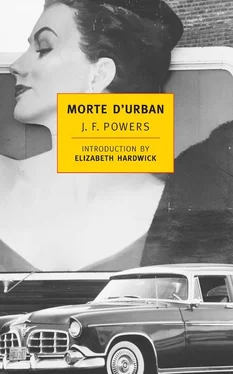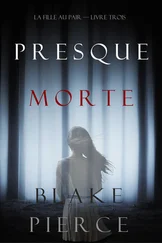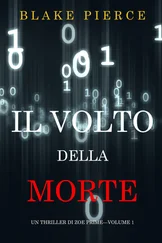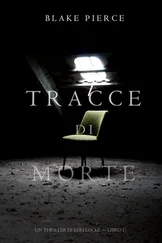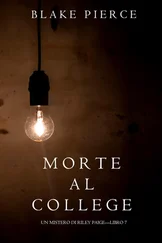Father Urban wanted to set up a serious program — talks by himself and others (if others worth hearing could be found), classes in the papal encyclicals, the Great Catholic Books, and so on — but there just wasn’t the time for it, and perhaps more than time would’ve been lacking at St Monica’s for such a program.
So Father Urban played it safe and engaged the people on their own ground. He gave card parties for “seniors.” He put on barn or square dancing (as they preferred to call it) for “young marrieds.” He tried a rock-and-roll dance for “teens”—once. No trouble, no, but he found he didn’t care for it when he saw what it was like. Sleigh rides and skating parties, these presided over by Johnny, were better. For the children of the parish, and their mothers, there were all-cartoon programs in the best movie house in town. For Men’s Club, he sent away for films of Notre Dame football games, and these were studied at smoker sessions. For Altar and Rosary Society, nothing special, but there was always the possibility that he’d pop in and say a few words. The school nuns were not forgotten. He gave them the use of his (Phil’s) car, permission to shop at supermarkets, and occasionally he threw the boss a ten-dollar bill—“Buy yourself some cigars, Sister.” They all loved him. And he addressed the Home and School Association, the local equivalent of the P.T.A., something Phil had never thought, or cared, to do, and a number of fathers and mothers told him that he’d given them new hope.
Father Urban’s object in all this was simply to pump a little life into the parish, without being pretentious about it. He discouraged the notion that church-sponsored recreation is necessarily a means to sanctification — an error into which gambling parishes were forever falling. He said he hoped to see more people at the communion rail oftener, but he also said that nobody should feel that this was expected because of his or her perfect attendance at social affairs. He had to watch it, though, in and out of the parish. The Cathedral curates (Monsignor Renton called them Cox and Box) wangled an invitation to the Saturday-morning theater parties for the children of their parish, and then urged that short subjects of a religious nature be dropped into the all-cartoon programs. Father Urban rejected the proposal, saying it wouldn’t be fair to the kids or to the exhibitor, a Jew, who was already taking a loss on the deal.
Just as parish life quickened under Father Urban’s touch, so did life in the town. At noontime luncheons, at wedding breakfasts, at funeral parlors, wherever and whenever people gathered, in joy or sorrow, there was Father Urban. At least he’d put in an appearance. “Look at the clock!” Off he’d go, and be late at the next stop. “And the worst of it is, I can’t stay!” “ OHHHH! ” So he’d relent and say a few words. And then off to the hospital, to the county jail, or back to the rectory for a little talk with an erring soul, who might or might not show up. Yes, there were disappointments, a few anyway, for Father Urban was working with people, after all. Very few disappointments, actually. Yes, he received an anonymous letter with the curt message, “Drop Dead,” and, yes, a woman was offended when he laughed at the idea of serving coffee— cappuccino , she said — after the last Mass on Sunday, and, yes, alas, he heard that Cox and Box, doubtless smarting from their setback at his hands, were referring to the current regime at St Monica’s as one of bread and circuses.
“Wait’ll Lent starts,” he said one evening to parishioners thronging about him after a card party. “All this’ll have to stop.”
“Will you still be here, Father?”
“No, I’m afraid not, Charlie.”
“ OHHHH! ”
“That’ll be the hardest part about Lent for a lot of us,” said a woman— and that woman was Sylvia Bean .
In the past weeks, Father Urban had occasionally caught sight of Sylvia in the congregation at Mass on Sundays and at card parties, but he had stayed away from her, thinking he was avoiding trouble. In his first week at St Monica’s he’d called at her house in the course of census-taking, and she’d begged him to book the Shrapnel Brothers, the editor and the publisher of the Drover , into the parish. (They put on Lincoln-Douglas style debates, one brother getting to take the “conservative” position and the other having to take the “liberal” position, this determined by the toss of a coin, and the audience was left to judge the winner.) Sylvia Bean had offered to underwrite the cost of bringing the act to the parish. No, thanks, Father Urban had said after first asking what the Shrapnels charged for a performance, which in a professional way interested him, but Sylvia had persisted, and finally he’d said, “Over my dead body, Mrs Bean.” After that, she’d made him feel as she had when he dined with her and Ray in the Greenwich Village Room — that she was finished with him. Evidently he’d been wrong. That’ll be the hardest part about Lent for a lot of us . This, considering the source, was perhaps the strongest testimonial to the kind of job Father Urban was doing at St Monica’s.
Actually, everything would stop before Lent, for Father Urban was to top off his stay by preaching a mission. This, however, was moved back a week, after Monsignor Renton called from Florida to say that he and Phil were thinking of returning to Minnesota by the way of the Bahamas.
“You’re not waiting for warm weather, I hope,” said Father Urban.
“Has it been cold up there?” inquired Monsignor Renton — as if he hadn’t been reading the papers and subtracting eight or ten degrees from the Minneapolis readings to arrive at the temperatures in Great Plains.
“How’s Phil, Monsignor?”
“About the same.”
This could mean that Phil hadn’t yet been talked out of building a new church. “Is Phil there now? I’d like to say hello to him, if he is.”
“No, as a matter of fact, he isn’t.”
Phil could be in the next room, though, within easy hailing distance. This seemed more than just a possibility to Father Urban. “Did you call Father Udovic about this, Monsignor?” he asked, knowing that it irked Monsignor Renton to have to call Father Udovic about anything, and that he preferred not to hear the man’s name.
“I called the Chancery.”
“And Cox and Box?”
“It won’t hurt if they think I’m coming back earlier.”
“Well, O.K. then, as far as I’m concerned. But if I hear from Father Wilfrid to the contrary, I’ll call you back — collect. By the way, where are you staying now?”
“We’re checking out now. So long.”
Father Urban phoned the Hill. “I’ll be back in time for Lent, of course,” he told Wilf, who, however, seemed totally uninterested in the subject of his return. “Anything new?”
The brochure had gone to the Novitiate, Wilf said, but not to the printer. “Maybe it’s just as well. Maybe we should shoot for Holy Week, or late spring — or early summer. Lucky we don’t have retreatants here now.”
“The cold, you mean?”
“Weatherwise, it’s much like last year.”
“Yes, isn’t it?” said Father Urban, though what the weather had been like there — or anywhere — he didn’t know. “But otherwise?”
“Trouble in Parlor A. That north wall. We can’t get a bond.”
“A bond ?”
“Paint won’t dry. Wall’s too cold, and you put heat in that room, and the wall sweats. It’s the roof. It’s coming down through the wall.”
“The roof ?”
“Moisture. Melt and freeze. Melt and freeze. That’s where your roof goes.”
“Suppose it does, yes. Well…”
Читать дальше
